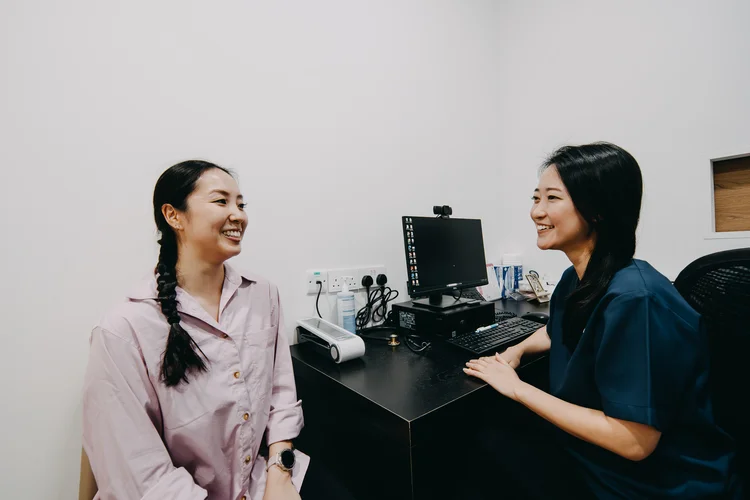How to Prevent STDs: 5 Key Tips for Staying Safe
Using protection, getting regular testing, and staying up-to-date with vaccinations are key to lowering your risk of sexually transmitted infections (STIs). These simple yet effective steps not only safeguard your sexual health but also help you avoid serious complications and long-term health issues. By being proactive, you’re investing in your well-being and saving yourself from unnecessary healthcare costs down the line.

In 2018, the top five sexually transmitted infections (STIs) in Singapore were chlamydia, gonorrhoea, syphilis, genital warts, and herpes. Given how easily these infections can spread, and the fact that some can be asymptomatic or lifelong, it is crucial to take proactive steps to protect yourself.
Understanding STD Transmission
STDs are infections caused by bacteria, viruses, or other harmful microorganisms like parasites. They are primarily spread through vaginal, anal, or oral sex with an infected person. Some STDs can also be transmitted through skin-to-skin contact, sharing of needles, or during pregnancy from mother to child.

1. Safe Sex Practices
Here are some good practices for safe sex:
- Using Protection Correctly: Condoms and dental dams are highly effective in preventing many STDs when used consistently and correctly, though they are not entirely foolproof. They may not fully protect against STDs spread through skin-to-skin contact, like syphilis, herpes, or HPV. It is important to choose the right size and ensure they are undamaged and not expired before use.
- Mutual Monogamy: Engaging in a mutually monogamous relationship, where both partners agree to have sex only with each other, greatly reduces the risk of contracting STDs.
- Open Communication: Honest and open discussions with your partner about sexual histories, testing, and preferred prevention methods can help safeguard both partners.

2. Regular Screening and Testing
Early detection and treatment through regular testing reduce the
risk of complications and further transmission. Testing should be done based on your sexual
activity and risk level, particularly when you have a new partner or
suspect potential exposure to an STD. It’s essential to consult your doctor for
personalised medical advice.
At healthscreening.sg, we offer specific STD tests and comprehensive
screening packages, with both male and female doctors available to perform these tests
based on your preferences.

3. Vaccination
Vaccination is a highly effective way to prevent certain STDs including hepatitis B and HPV. The hepatitis B vaccine helps prevent liver infections that can lead to chronic liver disease, cirrhosis (scarring), liver cancer, and liver failure. The HPV vaccine protects against strains of the virus that cause cervical cancer and genital warts. At healthscreening.sg, the prices for these vaccines are as follows:
| Vaccination | Price* |
|---|---|
| Hepatitis B | |
| Engerix-B® for Hepatitis B (per dose) | $54.50 |
| Twinrix® for Hepatitis A & Hepatitis B (per dose) | $125.35 |
| HPV | |
| Cervarix® 2 | $96 (MediSave-claimable) |
| Cervarix® 2 (CHAS Orange / CHAS Blue) | $23 |
| Cervarix® 2 (CHAS Green / Singaporeans) | $45 |
| Gardasil® 9 | $250 |
*Prices are NETT and inclusive of GST.
^Prices last updated on
Jan 28, 2026. While every effort is made to keep pricing information up to date, please contact our team to confirm the latest rates.
4. Open Communication and Awareness
- Communicating Openly with Your Partner: Open discussions about sexual health build trust and foster shared responsibility for safe sex practices. If comfortable, sharing your test results openly and agreeing on preventive measures together can protect both partners.
- Staying Informed and Educated: Stay informed about STDs and their prevention by consulting official and reputable sources.

5. Minimising Risky Behaviours
- Avoiding Casual and Unprotected Sex: Limiting casual sex and consistently using protection during sexual encounters significantly lowers the risk of contracting STDs.
- Reducing the Number of Sexual Partners: Limiting or reducing the number of sexual partners decreases the likelihood of encountering an infected individual. A monogamous relationship with an uninfected partner is the safest way to prevent STDs.

Summary
Preventing STDs is vital for maintaining sexual health and overall well-being. By understanding and practising safe sex methods, you can significantly reduce your risk of infection. Staying informed and taking proactive steps will help protect your health and that of your loved ones in the future.
Why Choose Us?








Navigate Easy With Google Maps
Health Screening Singapore (Anson House)
Nearest MRT: EW15 Tanjong PagarHealth Screening Singapore (Camden Medical Centre)
Nearest MRT: TE13 Orchard BoulevardHealth Screening Singapore (CPF Jurong Building)
Nearest MRT: NS1/EW24 Jurong EastFrequently Asked Questions (FAQ)
The only way to prevent an STD is by practising abstinence, meaning avoiding vaginal, anal, or oral sex altogether.
1) Always use condoms and use them correctly 2) Commit to mutual monogamy 3) Undergo regular STD screenings 4) Get vaccinated for HPV and hepatitis B 5) Don’t share needles 6) Limit sexual partners 7) Avoid casual and unprotected sex 8) Communicate openly with partners about health and testing 9) Practise good personal hygiene 10) Stay educated on STD prevention.
Safe sex practices, regular screenings, and open communication with your partner can help reduce stress. Staying informed and seeking advice from doctors can also offer peace of mind.
STDs have been around for centuries, with some infections noted in ancient records. They arise from bacteria, viruses, and parasites transmitted through sexual contact.
To reduce your risk of getting an STD, get regular screenings, practise safe sex, engage in a monogamous relationship with an uninfected partner, and receive vaccinations for HPV and hepatitis B.
Consistent condom use, limiting sexual partners, regular screenings, avoiding casual and unprotected sex, and getting vaccinated for HPV and hepatitis B are key ways to lower your risk.
Condoms greatly lower the risk of many STDs, but they aren’t foolproof. Some STDs can still be spread through skin-to-skin contact in areas not covered by a condom.
Since many STIs don’t have visible symptoms, testing is the only reliable way to determine if someone has an STI. Open communication and mutual testing with partners are important.
Certain STDs, like chlamydia, gonorrhoea, and syphilis, can be cured with antibiotics. Others, such as herpes and HIV, cannot be cured but can be managed with ongoing treatment.
Worry about having an STD can come from a lack of information, previous risky behaviour, or symptoms. Getting tested and speaking with a doctor can help alleviate concerns.
The immune system can sometimes fight off certain STDs, like HPV, on its own. However, most STDs need medical treatment, making regular testing and early treatment vital.
The severity of STDs varies, but HIV, syphilis, herpes, HPV (due to cancer risk), and hepatitis B are generally considered the most serious due to their potential long-term health effects.
STDs are primarily transmitted through vaginal, anal, or oral sex with an infected individual. They can also spread via skin-to-skin contact, needle sharing, or during childbirth from mother to child.
